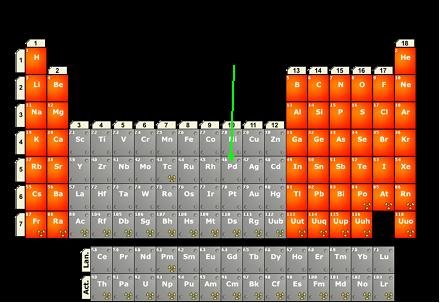Soon bacteria will be able to be used in the conversion of metal-containing waste into important catalysts for the creation of clean energy - so claim scientists whose article was published in the scientific journal Microbiology.

Researchers from the School of Biosciences at the University of Birmingham have revealed the mechanisms that allow the common soil bacterium Desulfovibrio desulfuricans to utilize the important metal palladium from sources of industrial waste.
Palladium is one of the platinum group metals, and is one of the most important resources on earth. It is used in many applications, thanks to its unusual chemical properties. Platinum group metals are used in many catalytic systems and are the active components in automotive catalytic converters that reduce greenhouse gas emissions.
Dr. Kevin Deplanche who led the research explained why new ways to recover metals from this group are so needed. "These metals originate from a finite reserve, which is reflected in their high market price today." Over the past decade, demand for these metals has consistently exceeded supply, so research into alternative ways to recover palladium from secondary sources is extremely important to ensure future availability of these reserves."
Previous research in this laboratory showed that the bacterium Desulfovibrio desulfuricans is able to transform palladium metal found in industrial waste into metallic nanoparticles with biocatalytic activity. Now, the researchers were able to accurately identify the mules responsible for the conversion process.
Enzymes of the type hydrogenase (Hydrogenase), located on the outer membrane of the bacterium, carry out the redox of the palladium, a reaction that leads to the accumulation of catalytic nanoparticles. The bacterial cells coated with palladium nanoparticles are called "BioPd".
The research group believes that these bacteria have a great ability to be used in the production of clean energy. "Research in our group showed that these bacteria are an excellent catalyst for the treatment of stubborn pollutants, such as chromium, used in the paint industry. These bacteria could even be used in hydrogen-based fuel cells to produce hydrogen-free electricity," said the researcher. "Our ultimate goal is to develop a one-step technology that enables the conversion of metal-containing waste into very important catalysts for the field known as "green" chemistry and for the production of clean energy," adds the researcher.

3 תגובות
Hello moshe
Does it follow from your answer that the ability to break down plastic can be given to genetically modified bacteria?
Hello Mark.
Basically, plastics, synthetic polymers and composite materials contain chemical bonds that are not found in nature, and therefore there are no natural bacteria capable of breaking them down.
Are there bacteria capable of breaking down plastic?